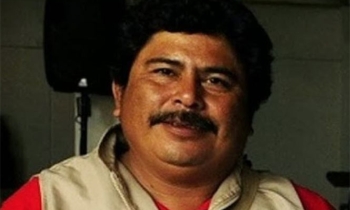In Bangladesh a journalist doesn't know who is going to attack him/her next. Reckoned to be one of the most dangerous places for a journalist to be in, the country unfailingly lives up to its reputation every few weeks. Barely had the brutal attack on an Indian journalist sunk in, that activists of the ruling Bangladesh Nationalist Party (BNP) let loose their ire on a newspaper that is one of its most trenchant critics.

DN Mohanty, correspondent of All India Radio (AIR) in Bangladesh, was attacked when he returned home in the evening July 31 after attending a briefing by Indian foreign secretary Shyam Saran in a nearby Dhaka hotel. Two men were waiting for him in his building's lift. They followed him to his apartment, where they gave him a beating that lasted several minutes. Mohanty was left unconscious.
The attack took place in a district that was under high security at the time because the Indian and Pakistani foreign ministers were meeting there that evening. Despite the marks of many blows to Mohanty's head, torso and right arm, doctors at the hospital said he had food poisoning. They appeared to have issued this statement under pressure from the authorities, according to Reporters sans Frontières (RSF). Although told of the attack, the Indian foreign secretary made no comment, thereby helping to hush up the case.
"In view of the repeated attacks against journalists in Bangladesh, the authorities ought to seriously consider the possibility that the attack on Mohanty was linked to his work," RSF said. "The Bangladeshi authorities should stop spreading lies about this case and order an investigation with the aim of identifying and punishing those responsible."
International Federation of Journalists (IFJ) President Christopher Warren said, "The beating of Mohanty is sickening and such brutality must not be tolerated. Bangladesh has an appalling record of impunity and lack of accountability for those who have murdered, assaulted or harassed journalists. The IFJ calls for a full independent investigation into his attack to ensure those responsible are swiftly brought to justice."

On August 13, BNP supporters in Tangail burnt copies of the daily Prothom Alo and Janakantha for publishing what they alleged were "false news reports" against Minister for Expatriate Welfare and Overseas Employment Lutfor Rahman Azad, the Daily Star reported. The two publications had recently carried stories that revealed that Azad had bought property from one Islamic Trade and Commerce Limited (ITCL) at a throwaway price. The government closed ITCL for unauthorised banking activities few years back.
Earlier, on August 9, Prothom Alo publisher Mahfuz Anam, editor Matiur Rahman and reporter Zahid Hossain were issued a contempt notice by the High Court for publishing a report on harassment of justice seekers in the HC Division of the Supreme Court.
The High Court (HC) yesterday issued a contempt rule on The Prothom Alo Publisher Mahfuz Anam, Editor Matiur Rahman and Reporter Zahid Hossain for publishing a report on harassment of justice seekers in the HC Division of the Supreme Court. The daily had carried the report headlined "Harassment of people seeking hearing of cases in the High Court" on July 16.
Journalists in Bangladesh, in fact, are at the receiving end from all fronts.
On July 5 there was a bomb attack on the office of magazine Weekly Blitz whose editor is on trial for sedition after writing about radical Islam. Editor Salah Uddin Shoaib Choudhury told the Committee to Protect Journalists (CPJ) that two small devices exploded outside his office in capital Dhaka causing minor damage. No one was injured. He said two other unexploded bombs were found inside the office. Although the attacks have received no coverage in the English-language press, they were confirmed by Nayeemul Islam Khan, editor of the vernacular daily Amader Shomoy (Our Time) .
Choudhury, whose sedition trial was scheduled to resume July 13 in Dhaka, has written about the spread of Islamic militancy in Bangladesh, and criticised anti-Israeli attitudes in Muslim countries including Bangladesh. Choudhury spent 17 months in jail before his release on bail in May 2005. Sedition carries the death penalty.

On May 29, more than 20 BNP supporters attacked a peaceful protest by journalists in the western town of Kushtia. Using stones and sticks they wounded 19 people, including chief editor of Bangladesh Observer and then-president of the Bangladesh Federal Union of Journalists, Iqbal Sobhan Chowdhury. He told Human Rights Watch that supporters of local BNP legislator Shahidul Islam attacked and disrupted the protest. "They were throwing stones and chairs and I was hit on the forehead," he said.
On May 30, about 20 men, reportedly Shahidul Islam supporters, stormed the office of Quality Press in Kushtia, halting the printing of a local newspaper, Dainik Andolaner Bazar. The paper has not been published since the attack. The following day, eight journalists were reportedly injured when the police in Satkhira broke up a silent procession of journalists protesting the first Kushtia attack.
Journalists at the May 29 demonstration were protesting threats by Shahidul Islam. At least four journalists had reportedly received threats in recent months and fled Kushtia after publishing reports that alleged Islam's involvement in corruption. On May 9, Islam filed charges against the journalists, accusing them of extortion because, he said, they had demanded money to keep the articles out of print.
According to the Bangladesh Federal Union of Journalists, 12 journalists have been killed during the current government's four years in office. Human rights organisation Odhikar said in early June that 43 journalists had been injured in attacks in May 2006 alone. In most cases, the culprits are yet to be brought to the book.

However, in a rare case in itself, a Dhaka court on August 15 framed charges against 10 people accused in the murder of journalist Gautam Das. Das, 30, Faridpur bureau chief of Dainik Samakal, was brutally killed on November 17 last year.
Judge Shahed Noor Uddin of the Speedy Trial Tribunal-1 framed the charges where six out of the 10 accused were present. He fixed August 22 for trial of the case. Four of the accused are still at large, while the rest are now on bail. The six accused, who were present in the court, pleaded not guilty and demanded justice before the judge after the charges were read out to them. Charges were framed against the four absconding accused in absentia and the trial will continue in their absence.
Dainik Samakal correspondent Hasanuzzaman had filed a murder case with Faridpur Police Station without mentioning any names of the killers on November 18 last year. The investigation officer pressed charges against 10 people on January 19, 2006, showing 31 people as prosecution witnesses. Three of the accused had made confessional statements to first class magistrates at different dates during the investigation. Earlier, the case was transferred to the trial for its quick disposal.









